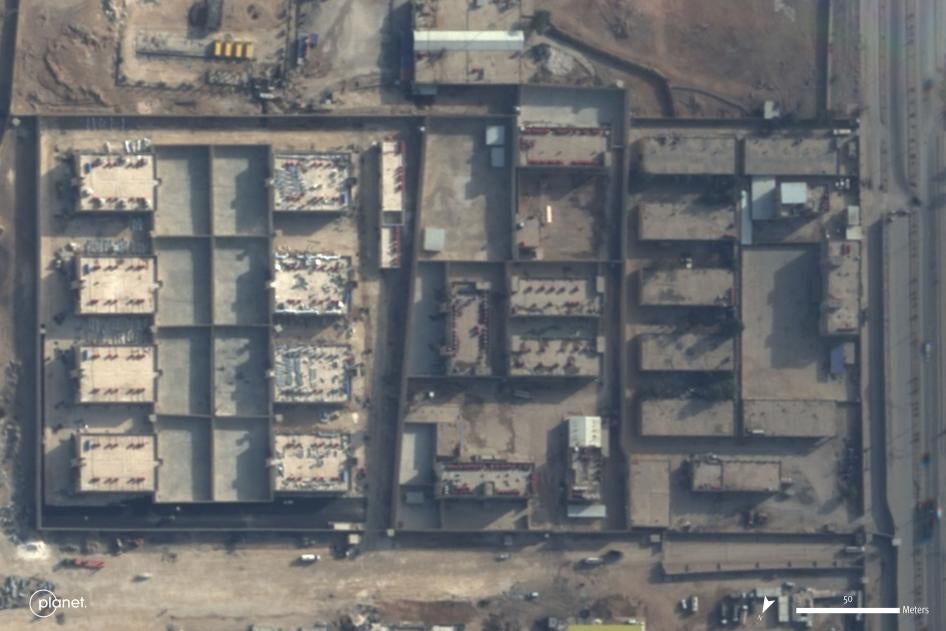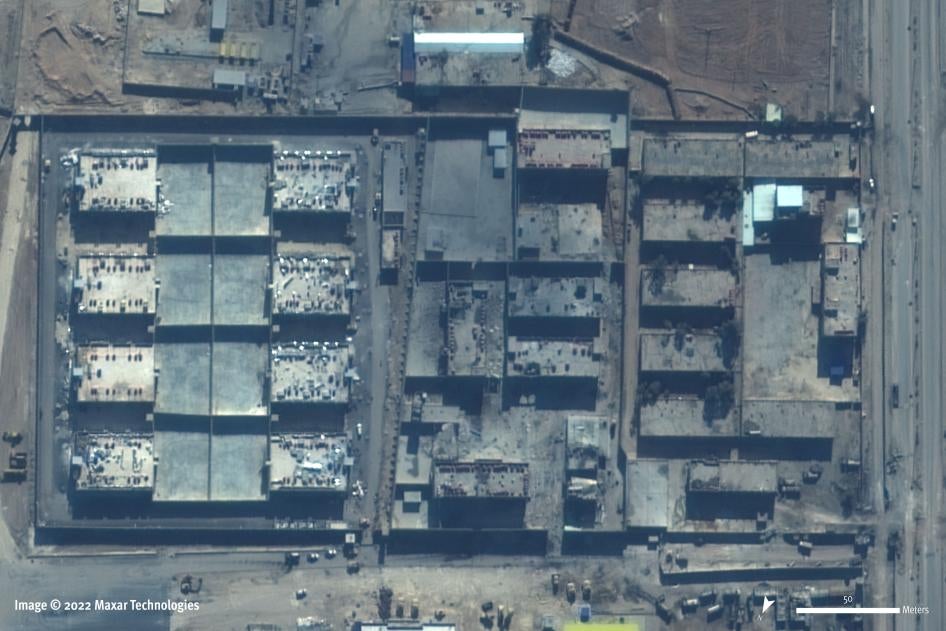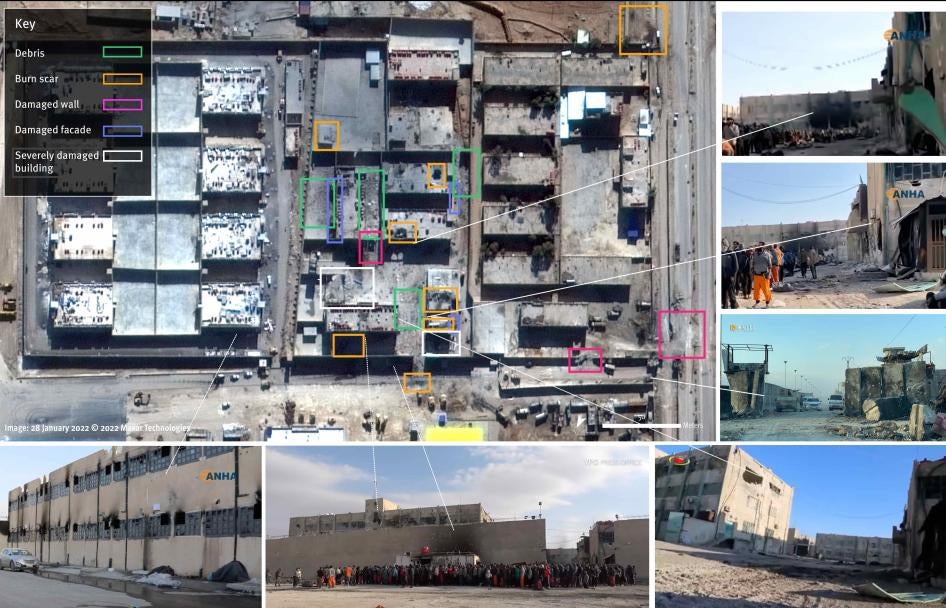The Kurdish-led armed force in northeast Syria should ensure the humane treatment of all men and boys it has evacuated or recaptured from a prison that the Islamic State (ISIS) assaulted and held for several days, Human Rights Watch said today. The regional fighters and US and UK forces supporting them should assess whether their forces complied with the laws of war during operations to recapture the prison and take all feasible measures to protect civilians during operations to find ISIS members and escaped detainees.
ISIS fighters assaulted al-Sina'a prison in the Ghweran section of al-Hasakah city on January 20, 2022. The Kurdish-led armed force, the Syrian Democratic Forces (SDF), said it regained full control on January 30 following a battle backed a US-led coalition against ISIS that left more than 500 people dead. The prison held about 4,000 male ISIS suspects or family members, including 700 boys, most from Syria and Iraq and the rest from dozens of other countries. The foreigners had been unlawfully detained in dire conditions for nearly three years.
"The Syrian Democratic Forces began evacuating men and boys from the besieged prison days ago, yet the world still has no idea how many are alive or dead," said Letta Tayler, associate crisis and conflict director for Human Rights Watch. "The detaining authorities in northeast Syria should end their silence on the fate of these detainees, including hundreds of children who were victims of ISIS."
The SDF should immediately allow international humanitarian groups to visit the detainees it has evacuated or recaptured from al-Sina'a prison and provide them with essential care. They should make public how many detainees, including children, were killed, wounded, and evacuated during the battle to retake the prison.
The US-led coalition against ISIS said the detainees were being held at a more secure facility, which two sources told Human Rights Watch was a new, UK-funded prison near al-Sina'a. About 300 detainees were transferred on January 24 to Alaya prison in the city of Qamishli, the Rojava Information Center told Human Rights Watch, but it was not clear if they remained there.
"Everyone is in safe places. They receive good care," Siyamend Ali, media commander for the SDF, told Human Rights Watch, but he did not provide any details.
The Syrian Democratic Forces said that ISIS used the detained boys as human shields during the 10-day battle and that they had taken steps to protect the children in their counter attacks on the prison, but did not clarify what those steps were.
Reports of Children Killed
Midway through the prison battle, two foreign detainees still inside the prison told Human Rights Watch that many detainees were killed in the fighting, including children. A Canadian detainee said he believed "tens" of children were killed and described a child bleeding to death in his arms. A 17-year-old Australian boy who said he was hit in the head and hand in an Apache airstrike estimated at least 15 to 20 children were killed including two teenage friends who he said were shot down in front of him.
"I was just sitting in my cell and an explosion happened," the Australian boy said in a panicked message midway through the siege. He asked not to be identified by name, but Human Rights Watch has verified his identity. "There was shooting at our building [cell block]. I ran out with my friends and on the way my friends got killed in front of me, a 14-year-old, a 15-year-old. …"
"I kept running," the Australian boy said, but "I got injured in my head and my hand. I lost a lot of blood." The boy said he saw "a lot of bodies, dead bodies, and there's a lot of injured people screaming from pain." He added: "There's no doctors here, there's no one who can help me. I'm very scared. I need help. Please."
The Canadian man as well as a detainee who described himself as an 18-year-old US citizen told Human Rights Watch that the men and boys inside the prison had run out of food, drinking water, and medicine during the siege.
"We're starving. We're thirsty. There's no food, there's no water, there's no medical supplies at all," the 18-year-old said. "We're scared. We just need someone to help us get out of here, to help get us to safety."
Boys had been held separately from adults but when ISIS stormed al-Sina'a, chaos ensued and adults and children were mixed together, including the injured and other detainees needing care such as people with tuberculosis or mental health conditions, the Canadian detainee said. Human Rights Watch has received reports since 2020 of deadly tuberculosis outbreaks and acute shortages of medicines and other supplies in al-Sina'a and other prisons for ISIS suspects in northeast Syria.
Human Rights Watch lost contact with the detainees on January 26.
The SDF should work with aid groups to get word to family members on whether their relatives in al-Sina'a are alive, dead, or injured, Human Rights Watch said. Many family members have not heard from their imprisoned relatives for years.
"I pray there is a way to know that he is okay," a woman related to a Western detainee who had been held in al-Sina'a told Human Rights Watch.
Human Rights Watch has received a number of allegations from detainees, family members, or their lawyers since 2019 of the Syrian Democratic Forces abusing detained ISIS suspects but cannot verify the allegations. The Kurdish-led force and members of the US-led coalition against ISIS, including US and UK forces supporting the current operations, should ensure humane treatment of all those who surrendered or were evacuated or recaptured, and to allow independent monitors access to the detainees.
Under international law, all parties to a conflict are required to take all feasible precautions to protect civilians from harm. In case of doubt that a person is a valid military target, that person should be considered a civilian. Forces may target the military objectives only if the anticipated military gain outweighs the anticipated harm to civilians or civilian property. Indefinite detention without charge amounts to collective punishment of detainees and their family members, which is a war crime.
The foreign detainees in al-Sina'a are among nearly 45,000 men, women, and children from nearly 60 countries held in deeply degrading and often inhuman conditions in northeast Syria as ISIS suspects and family members. The vast majority of these foreigners are young children held with their mothers in locked camps. The Syrian Democratic Forces and other regional authorities have repeatedly called on countries to bring them home, saying they lack the resources to care for them and to prosecute those suspected of serious crimes. But few countries outside of Central Asia have repatriated their nationals or taken other significant steps to end their abuse.
Recapturing the prison does not resolve the international crisis created by the indefinite and arbitrary detention of these foreigners, Human Rights Watch said.
All countries with nationals detained in northeast Syria should repatriate or help bring home their nationals for rehabilitation, reintegration, and, as appropriate, prosecution. The US-led coalition, United Nations bodies, and countries involved in the northeast Syria crisis should help resettle other detainees, also with prosecutions as appropriate, in third countries if they are at risk of ill-treatment in their countries of origin. All of these detainees should be immediately released to safety unless they are brought before an independent judge who can rule on the legality and necessity of their detention.
Governments that actively contribute to this abusive confinement may be complicit in the unlawful detention and collective punishment of thousands of people, most of them women and young children.
"The al-Sina'a prison crisis was the predictable result of governments turning a blind eye to the fate of their nationals and all others held in horrific conditions in northeast Syria," Tayler said. "This assault should be a wakeup call to countries that outsourcing responsibility for their nationals won't make this problem go away. It will only increase the suffering of these detainees, most of them young children, and deprive ISIS victims of justice."
Scant Casualty and Recapture Details
The Syrian Democratic Forces (SDF) announced on January 31 that 77 prison employees, 40 of its fighters, and 4 civilians were killed in the 10-day battle to retake the prison, as well as 374 "Daesh [ISIS] terrorist detainees and attackers." They provided no breakdowns, such as the number of detainees killed and how many were children, the number of injured, the number of detainees who joined the uprising, the number of adults and children back in their custody, or the number of adults and children unaccounted for, despite repeated queries from Human Rights Watch and media.
On January 31, a commander for the SDF acknowledged that imprisoned children had been killed after The New York Times reported seeing the bodies of two teenage boys who had been shot dead near the prison and appeared to be escaped detainees. The Times said locals told them the boys were shot by the SDF, but it was unable to confirm any details about them or their deaths. The commander said only that "a very small number" of the dead were children.
The SDF said as many as 300 ISIS fighters had stormed al-Sina'a prison. It said on January 27 that 3,500 detainees - nearly the entire prison population - had surrendered, but its announcement a day earlier that it had regained total control of the prison turned out to be premature, raising questions about those figures.
US and UK-Backed Military Operations
The US-led coalition against ISIS said it conducted air strikes, reportedly with Apache helicopters and F-16 fighter jets, and the Pentagon said the US had provided ground support in support of the SDF during the battle to recapture the prison. UK special forces also assisted according to media and the Rojava Information Center. Satellite imagery and videos analyzed by Human Rights Watch showed extensive damage to the prison compound.
During and after the prison siege, the SDF searched house-to-house for ISIS members in nearby areas and elsewhere in northeast Syria, displacing tens of thousands of local residents and in some cases destroying homes where they suspected armed militants were hiding.


Before: December 14, 2021: Satellite imagery © 2022 Planet Labs Inc. After: January 28, 2022: Satellite imagery © 2022 Maxar Technologies
Unlawful Detentions
Backed by the US-led coalition, the SDF rounded up tens of thousands of Syrian and foreign men, women and children, including most of the men and boys they then detained in al-Sina'a, during the fall of the last ISIS-held territory in northern Syria in February and March 2019. None of the foreign detainees have been brought before a judge to determine the necessity or legality of their detention, making their indefinite detention arbitrary and unlawful.
The conditions for detainees in al-Sina'a were often inhuman and life-threatening, marked by severe overcrowding, scarce access to the outdoors and sunlight, and insufficient medicine and food, Human Rights Watch and the United Nations independent expert on counterterrorism said. The children were to start receiving education through a nongovernmental organization in early 2022 but the prison assault threw that timeline into doubt, an organizer told Human Rights Watch.
Most if not all the detained foreign boys were brought to Syria by their parents. About 400 of the boys imprisoned at al-Sina'a were Syrian, up to 200 were Iraqi, and 100 or more were from other countries, northeast Syrian authorities told Human Rights Watch. Some of the 700 imprisoned boys were as young as 12, the SDF said. Detainees told Human Rights Watch and media reported that some were as young as 10. Under international law, all children associated with armed groups should be treated first and foremost as victims and detained only as an exceptional measure of last resort.
Although the US-led coalition has spent millions of dollars to improve security and other conditions at al-Sina'a and the UK has spent US $20 million to build a nearby prison, these measures do not change the fact that indefinite detention without judicial review is unlawful, Human Rights Watch said.







